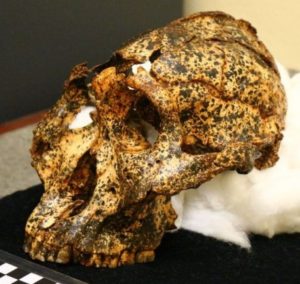 Three years after archaeologists found fragments of a 2 million year old skull in a quarry near Johannesburg, South Africa, researchers have pieced it together and interpreted it.
Three years after archaeologists found fragments of a 2 million year old skull in a quarry near Johannesburg, South Africa, researchers have pieced it together and interpreted it.
The skull belonged to a male Paranthropus robustus, a hominid species that died out. It was found just a few feet away from where the skull of a Homo erectus, a human ancestor, was unearthed in 2015. The two finds suggest the two species may have co-inhabited the landscape at the same time.
They were radically different: Paranthropus robustus had large teeth and a small brain, implying it lived on hard-to-chew plants “like tubers and bark,” while Homo erectus had a large brain and small teeth, suggesting it “was more likely to have eaten both plants and meat.”
One thrived, the other became extinct, possibly because climate change wiped out or severely reduced its food source. If it had been the other way around, you might be a monkey.